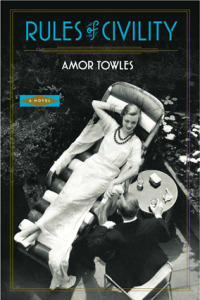
Published by Viking on July 26, 2011
Some books unfold at a leisurely pace and demand to be read in the same way -- nibbled and savored, the better to prolong the pleasure. Rules of Civility is one of those. It's a throwback novel, the kind in which unashamedly bright characters engage in impossibly witty conversations. The novel takes its name from the 110 rules that George Washington crafted during his teenage years. Katey Kontent eventually sees Washington's rules not as "a series of moral aspirations" but as "a primer on social advancement." They are the rules that shape a masquerade in the hope "that they will enhance one's chances at a happy ending." Ultimately Rules of Civility asks a serious question about Katey's observation: Are the behavioral rules that define "civility" simply a mask that people wear to conceal their true natures? Or are the rules themselves important, and the motivation for following them irrelevant?
The story begins in 1966 but quickly turns back to 1938, the most eventful year in Katey's life. Katey and her friend Eve meet Tinker Grey, a charming young banker, at a jazz club on New Year's Eve. Their blossoming three-way friendship takes an unexpected turn when Eve is injured in an accident while Tinker is driving. Tinker's apparent preference for Katey shifts to Eve as she recuperates. Months later, something happens to cause a change in their relationship, giving Tinker a more important role in Katey's life. Along the way, Katey's career is leaping forward: from reliable member of a law firm's secretarial pool to secretary at a staid publishing house to gofer and then editorial assistant at a trendy magazine. As Katey socializes with the well-to-do and the up-and-coming, she learns surprising secrets about the people in her life, including Tinker, and learns some things about herself, as well.
Katey is an outsider socializing with a privileged group of people (white, wealthy, and sophisticated), but she remains the grounded daughter of a working class Russian immigrant. She treasures her female friends. She neither hides nor flaunts her intelligence. She makes choices "with purpose and inspiration" although she comes to wonder about them in later years. Like most people who use their minds, she's filled with contradictions. Reading Walden, she values simplicity; she fears losing "the ability to take pleasure in the mundane -- in the cigarette on the stoop or the gingersnap in the bath." At the same time, she enjoys fine dining and dressing well: "For what was civilization but the intellect's ascendancy out of the doldrums of necessity (shelter, sustenance, and survival) into the ether of the finely superfluous (poetry, handbags, and haute cuisine)?"
To varying degrees, the characters in this novel make mistakes (who doesn't?). As one character notes, "at any given moment we're all seeking someone's forgiveness." But when should forgiveness be granted? When does love require forgiveness? Towles avoids simplistic answers to these difficult questions; this isn't a melodrama in which characters ride out tragedies to arrive at a neat and happy ending. Ultimately, this is a nuanced novel that remains cautiously optimistic about life, crafted by a generous writer who sees the good in people who have trouble seeing it in themselves, a writer who believes people have the capacity for change.
Rules of Civility offers up occasional treats for readers in the form of brief passages from the books the characters are reading, snippets from Hemingway and Thoreau and Woolf, an ongoing description of an Agatha Christie novel. When Towles introduces a book editor as a character in the novel's second act, it seems clear that Towles shares the editor's old-fashioned respect for "plot and substance and the judicious use of the semicolon." Towles captures the essence of minor characters with a few carefully chosen words. In the same precise and evocative style he recreates 1938 Manhattan: neighborhoods, restaurants, fashions, and music. He writes in a distinctive voice, refined but street-smart, tailored to the era in which the novel is set. His dialog is sharp and sassy. The ending has a satisfying symmetry. If I could find something critical to say about this novel, I would, but I can't.
HIGHLY RECOMMENDED